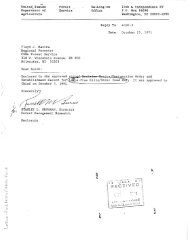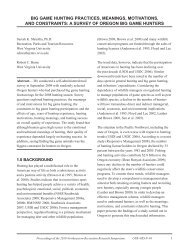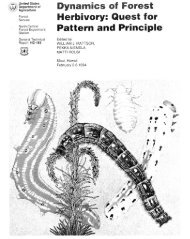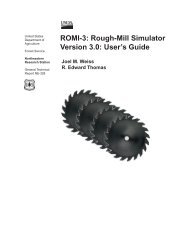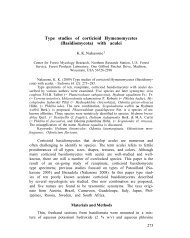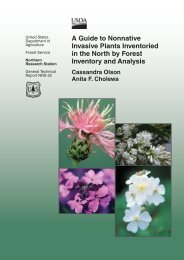Proceedings of the 2009 northeastern recreation research symposium
Proceedings of the 2009 northeastern recreation research symposium
Proceedings of the 2009 northeastern recreation research symposium
You also want an ePaper? Increase the reach of your titles
YUMPU automatically turns print PDFs into web optimized ePapers that Google loves.
aim is to sample <strong>the</strong> diversity and range <strong>of</strong> viewpoints<br />
expressed by <strong>the</strong> participants (Cross 2005). Th e<br />
proportion <strong>of</strong> individuals in a factor is not revealed in <strong>the</strong><br />
factor analysis; yet, distinctive points <strong>of</strong> view in <strong>the</strong> form<br />
<strong>of</strong> statements that distinguish each factor are revealed.<br />
Th e composition <strong>of</strong> <strong>the</strong> particular individuals that make<br />
up <strong>the</strong> factor is rarely <strong>of</strong> direct interest because <strong>the</strong> same<br />
viewpoints could be obtained from o<strong>the</strong>r individuals;<br />
however, <strong>the</strong> ways in which <strong>the</strong> factors diff er are <strong>of</strong> keen<br />
interest (Brown 1980). As such, generalizations in Q do<br />
not refer to demographics, but to segments <strong>of</strong> subjective<br />
communicability (Brown 1980). Th e concourse <strong>of</strong> ideas<br />
is sampled representatively instead <strong>of</strong> using <strong>the</strong> more<br />
traditional means <strong>of</strong> random sampling <strong>the</strong>ory related<br />
to <strong>the</strong> population <strong>of</strong> participants (Stephenson 1953).<br />
Th erefore, Q methodology seeks to capture and interpret<br />
communicated points <strong>of</strong> view that may be generalized<br />
back to <strong>the</strong> phenomenon being studied ra<strong>the</strong>r back to<br />
<strong>the</strong> population. Q methodology utilizes by-person factor<br />
analysis, instead <strong>of</strong> <strong>the</strong> traditional by-variable analysis,<br />
to identify groups <strong>of</strong> participants who factor comparable<br />
items toge<strong>the</strong>r (Watts and Stenner 2005). “Nothing more<br />
complicated is at issue” (Watts and Stenner 2005, p. 68).<br />
7.0 IMPLICATIONS FOR OUTDOOR<br />
RECREATION RESEARCH<br />
Q methodology was originally developed for use in<br />
psychology <strong>research</strong>. Since <strong>the</strong>n, it has been used to<br />
study participants’ attitudes, viewpoints, or perceptions<br />
in studies on healthcare, business, marketing, political<br />
science, and environmental science, to name a few<br />
(Brown 1993). Q methodology has been used successfully<br />
but very infrequently in outdoor <strong>recreation</strong> <strong>research</strong>.<br />
Lindhagen and Hornsten (2000) used Q methodology<br />
to study how forest management techniques infl uenced<br />
preferences and changes in <strong>recreation</strong>al use over a 20year<br />
period. Hirsh (1992) employed Q methodology<br />
to <strong>research</strong> Canadian university outdoor education<br />
programs. Christol (2002) explored diff erences in<br />
environmental educators’ beliefs in two countries. Ward<br />
(2008) used Q methodology to explore perceptions<br />
<strong>of</strong> risks and benefi ts associated with mountaineering.<br />
Rilling and Jordan (2007) looked at diff erent points<br />
<strong>of</strong> view toward leadership on extended outdoor trips.<br />
Lindley (2005) studied how participating in a wilderness<br />
experience program infl uenced students’ attitudes towards<br />
wilderness. Hutson and Montgomery (2006) conducted<br />
an inquiry using Q methodology to explore perceptions<br />
<strong>of</strong> outdoor <strong>recreation</strong> settings and ways <strong>of</strong> feeling close<br />
to natural environments. Finally, Wilson (2005) used Q<br />
methodology to study person-place engagements and user<br />
attachments to a <strong>recreation</strong>al area in Oklahoma.<br />
8.0 CONCLUSION<br />
Recreation <strong>research</strong>ers have increasingly used approaches<br />
that explore and value <strong>the</strong> subjectivity <strong>of</strong> <strong>recreation</strong><br />
experiences (Stebbins 1997). Q methodology systematically<br />
and thoroughly integrates subjectivity into <strong>the</strong> <strong>research</strong><br />
process and provides a “bridge” between qualitative and<br />
quantitative <strong>research</strong> (Cross 2005, Wilson 2005). By<br />
combining <strong>the</strong> strength <strong>of</strong> both quantitative and qualitative<br />
<strong>research</strong>, Q methodology can be a valuable tool for those<br />
who wish to study outdoor <strong>recreation</strong> experiences.<br />
9.0 CITATIONS<br />
Brown, S.R. 1980. Political subjectivity: Applications<br />
<strong>of</strong> Q methodology in political science. New Haven,<br />
CT: Yale University Press.<br />
Brown, S.R. 1993. A primer on Q methodology.<br />
Operant Subjectivity. 16(3/4): 91-138.<br />
Brown, S.R. 1996. Q methodology and qualitative<br />
<strong>research</strong>. Qualitative Health Research. 6: 561-567.<br />
Brown, S.R. 1997. Th e history and principles <strong>of</strong> Q<br />
methodology in psychology and <strong>the</strong> social sciences.<br />
British Psychological Society <strong>symposium</strong> on “A Quest<br />
for a Science <strong>of</strong> Subjectivity: Th e Lifework <strong>of</strong> William<br />
Stephenson,” University <strong>of</strong> London; and conference<br />
on “A Celebration <strong>of</strong> Life and Work <strong>of</strong> William<br />
Stephenson (1902-1989),” University <strong>of</strong> Durham,<br />
England. Retrieved August 15, 2006, from http://<br />
facstaff .uww.edu/cottlec/Qarchive/Bps.htm.<br />
Brown, S.R.; Ungs, T.D. 1970. Representativeness and<br />
<strong>the</strong> study <strong>of</strong> political behavior: An application <strong>of</strong> <strong>the</strong><br />
Q technique to reactions to <strong>the</strong> Kent State incident.<br />
Social Science Quarterly. 51: 514-526.<br />
Christol, P. 2002. A Q methodological study <strong>of</strong> beliefs<br />
among environmental educators in two nations.<br />
<strong>Proceedings</strong> <strong>of</strong> <strong>the</strong> <strong>2009</strong> Nor<strong>the</strong>astern Recreation Research Symposium GTR-NRS-P-66<br />
79





